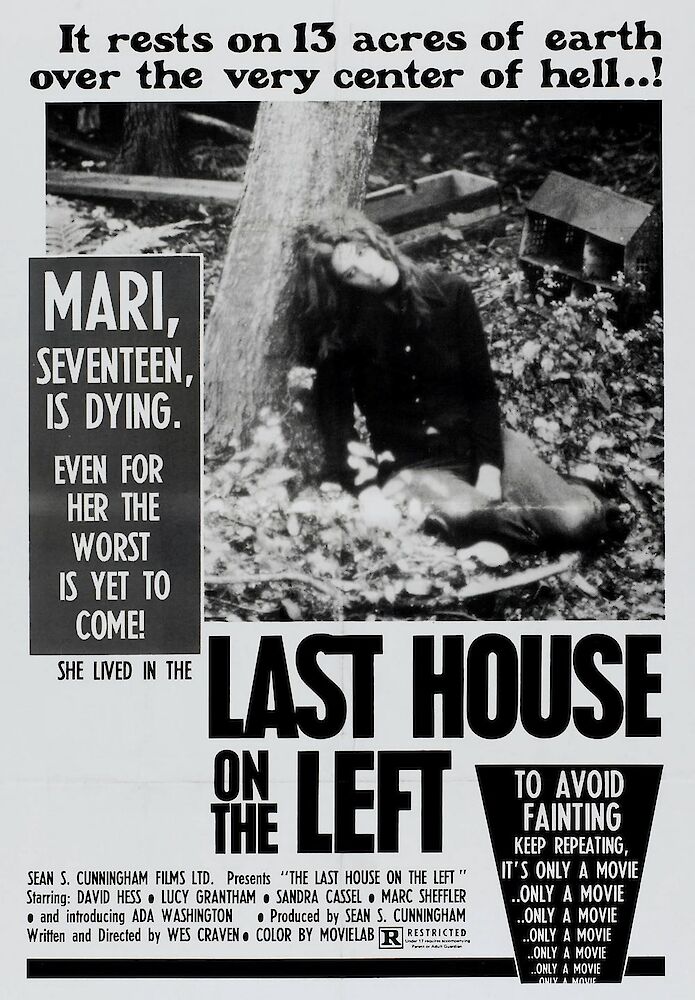My friend John Patrick Nelson has a terrific movie podcast called The Hold-Up, which he co-hosts with John Longino. On the show, both Johns discuss a film they remember fondly but haven't seen in years and then rewatch it to see if it holds up. Every year they do a Halloween episode during which they review a horror film. They are usually joined on this holiday episode by another good friend, John's wife Alison Locke Nelson, who is a writer and director of horror pictures. This year, the movie they rewatched was Wes Craven's 1972 shocker THE LAST HOUSE ON THE LEFT.

This is a down and dirty film about two suburban Connecticut girls who are abducted, raped, and killed by a gang of psychopaths. The creeps leaves the girls' bodies in the woods and, when their car breaks down, seek refuge in the closest house they can find. The house turns out to be the home of one of the murdered girls and when her parents realize who their guests are and what they have done, they exact a horrifying revenge.
I have a pretty high tolerance for most things, but sadism in movies is something I find hard to take, so I avoided seeing this film for many years because it has a reputation for being extremely graphic and cruel. However, after listening to this month's The Hold Up, the conversation was so thoughtful, smart, and insightful that I found myself thinking that perhaps I should give the film a look after all, so I did.
Craven was a college English professor who somehow made his way into the world of pornographic movies circa 1970 (he admitted he had something to do with the making of DEEP THROAT, though he never specified exactly what his role in the making of that Citizen Kane of XXX-rated movies actually was). After making a particular successful porno called TOGETHER with his partner Sean S. Cunningham (who would later go on to create the FRIDAY THE 13TH SERIES), their backers offered them the money to make a horror movie. A fan of Ingmar Bergman, Craven decided to do an exploitation version of Bergman's THE VIRGIN SPRING.
The result was a film that is as gruesome as its reputation implies. This very intense, violent, and sadistic movie is definitely not an easy watch. The film is not helped by its obviously low budget and its one-step-above-porn production values and often crude technique. However, the film is also a very effective one -- the film was shot on 16mm in a raggedy fashion that gives the piece a real documentary quality, which serves to enhance the film's realism. And although this was his first real feature film, Craven brings a relatively sophisticated sensibility to the picture, especially in the film's editing, which is quite (successfully) experimental, especially for the time and the genre. And, while the movie is clearly an exploitation picture, the violence and sadism does not feel exploitative, but rather necessary. This was a movie made in the aftermath of the Manson murders (the murder gang in the movie is clearly based on the Mansons) and in the midst of Vietnam and a rising crime rate in the US. Violence was everywhere at the time and in not shying away from showing the horror of violence he saw all around him, Craven produced a strong and surprisingly thoughtful condemnation of same -- accomplished in large part by dwelling on the emotional and psychological toll the violence takes on both the victims and perpetrators, something that most exploitation pictures never do and which gives the film a surprisingly moral weight. Craven also made a pretty strong statement about the violence directed against women that was prevalent then and is sadly still prevalent today. As a result, the movie feels illustrative rather than exploitative.
So, as intense and disturbing as the film was, I found it though-provoking and hard to shake. This is definitely not a film for everyone, but if you're of a mind and prepare yourself going in (certainly by listening to The Hold Up), it is worth a watch. Just keep telling yourself it's only a movie.

